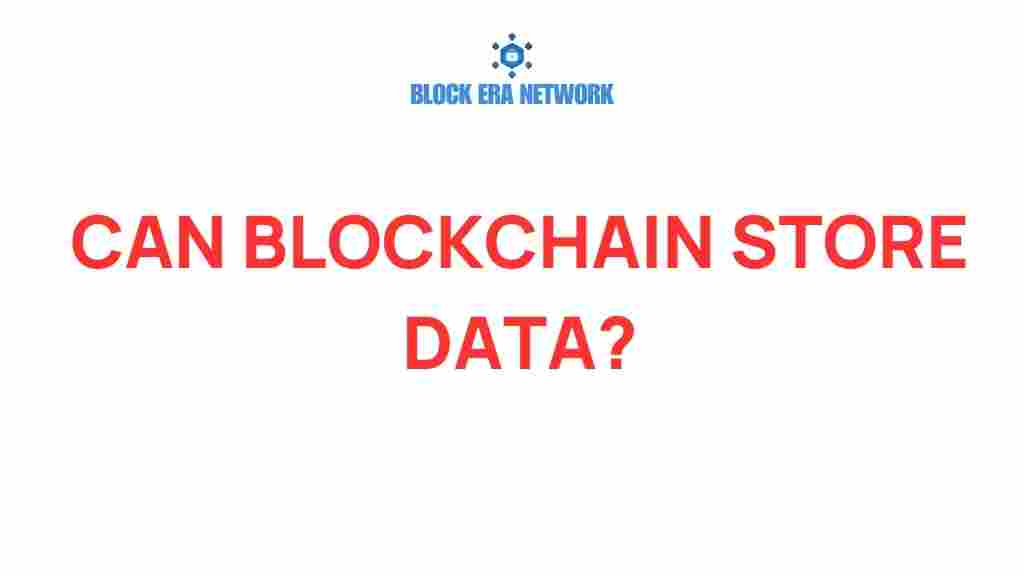Unveiling the Potential: Can Blockchain Truly Store Data?
The emergence of blockchain technology has undoubtedly revolutionized the way we perceive data storage and management. While traditionally viewed as the backbone of cryptocurrencies, blockchain’s potential extends far beyond this domain. In this article, we will explore how blockchain can be a robust solution for data storage, emphasizing its decentralized technology, security features, innovation, and implications for the future of data.
Understanding Blockchain and Data Storage
At its core, blockchain is a digital ledger that records transactions across many computers in such a way that the registered transactions cannot be altered retroactively. This feature ensures a high level of transparency and security, making blockchain an attractive option for data storage. Unlike traditional storage methods, which often rely on centralized servers, blockchain operates on a decentralized network, offering several advantages:
- Decentralization: Eliminates single points of failure and enhances data integrity.
- Transparency: All transactions are visible to participants, ensuring accountability.
- Security: Uses cryptographic techniques to secure data against unauthorized access.
- Immutability: Once data is recorded, it cannot be altered, ensuring data authenticity.
The Mechanism of Blockchain Data Storage
To understand how blockchain can store data, it’s essential to grasp its underlying mechanism. Here’s a step-by-step process:
- Data Creation: Data is created and formatted into a block.
- Block Verification: The block is verified by network participants through consensus mechanisms like Proof of Work or Proof of Stake.
- Block Addition: Once verified, the block is added to the existing blockchain.
- Data Access: Users can access the data through the blockchain, ensuring they see the most up-to-date information.
This process highlights how blockchain maintains a secure and transparent record of data, making it a viable option for various applications, from financial transactions to healthcare records.
Benefits of Using Blockchain for Data Storage
The benefits of employing blockchain for data storage are numerous and noteworthy:
- Enhanced Security: Data stored on the blockchain is encrypted and immutable, providing a high level of security against cyber threats.
- Increased Transparency: All participants in the network can view the data, promoting transparency in data management.
- Cost Efficiency: Reduces costs associated with data storage and management, as it eliminates the need for intermediaries.
- Scalability: Blockchain technology is evolving, with solutions being developed to enhance its scalability for larger data sets.
- Decentralized Control: Users have more control over their data, reducing reliance on centralized authorities.
Challenges of Blockchain Data Storage
Despite its advantages, blockchain data storage is not without challenges:
- Scalability Issues: Current blockchain networks face limitations on transaction speed and data capacity.
- Energy Consumption: Some consensus mechanisms require significant energy, raising sustainability concerns.
- Regulatory Concerns: The legal status of blockchain data storage varies by region, leading to compliance challenges.
- Complexity: Implementing blockchain solutions can be complex and requires a skilled workforce.
Innovations and Future of Data Storage with Blockchain
The future of data storage is promising, with innovations in blockchain technology paving the way for new applications. Some key trends include:
- Interoperability: Development of standards that allow different blockchain networks to communicate with each other.
- Layer 2 Solutions: Technologies like Lightning Network aim to enhance transaction speeds and scalability.
- Data Privacy Enhancements: Cryptographic techniques such as zero-knowledge proofs are being integrated for enhanced privacy.
- Integration with IoT: Blockchain can provide secure and efficient data management for IoT devices.
These innovations indicate a bright future for blockchain as a data storage solution, positioning it as a fundamental component of digital infrastructure.
Troubleshooting Common Issues in Blockchain Data Storage
While blockchain offers a revolutionary approach to data storage, users may encounter issues. Here are some common problems and solutions:
- Slow Transaction Speeds: If you experience delays, consider using a blockchain with higher transaction throughput or implementing layer 2 solutions.
- Data Retrieval Challenges: Ensure you are using the correct protocols to access data stored on the blockchain. Familiarize yourself with the specific blockchain’s query methods.
- High Transaction Fees: During peak times, transaction fees can soar. Consider timing your transactions during off-peak hours to save costs.
- Network Congestion: If the network is congested, wait for it to clear or explore alternative blockchains that offer better performance.
Conclusion: The Path Forward
In summary, blockchain technology presents a transformative opportunity for data storage, offering unparalleled security, transparency, and decentralization. Despite the challenges that lie ahead, the continuous innovation in this field suggests that blockchain will play a pivotal role in the future of data. As we move forward, embracing the principles of decentralized technology could lead to more efficient and secure data management solutions.
For further reading on blockchain and its applications, check out this comprehensive guide on blockchain technology.
As we explore the potential of blockchain for data storage, it’s clear that this digital ledger system is not just a passing trend but a foundational shift in how we think about and manage our data.
This article is in the category Blockchain Basics and created by Block Era Network Team
